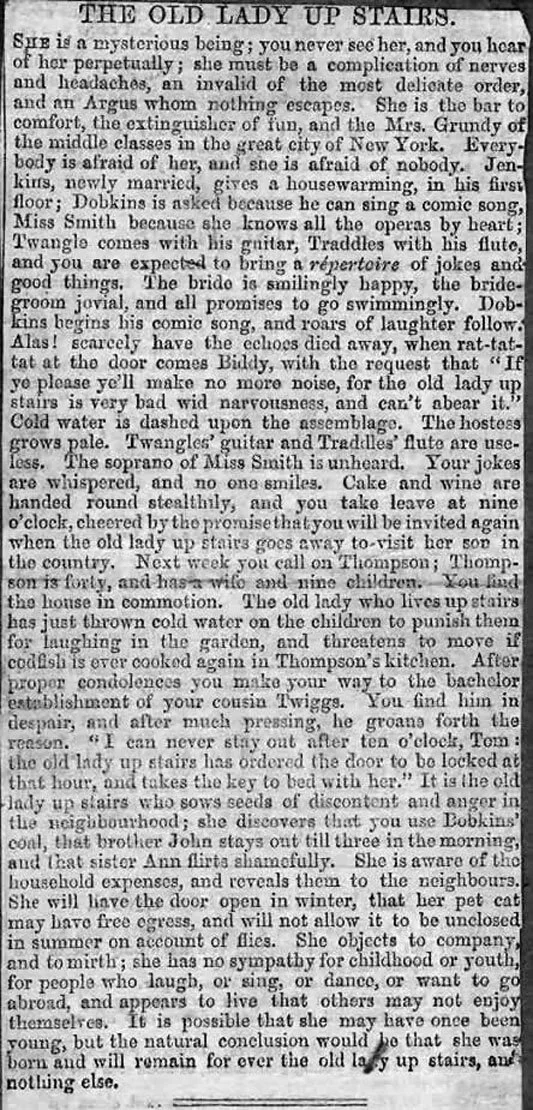The Old Lady Up Stairs
SHE is a mysterious being; you never see her, and you hear of her perpetually; she must be a complication of nerves and headaches, and invalid of the most delicate order, and an Argus whom nothing escapes. She is the bar to comfort, the extinguisher of fun, and the Mrs. Grundy of the middle classes in the great city of New York. Everybody is afraid of her, and she is afraid of nobody. Jenkins, newly married, gives a housewarming, in his first floor; Dobkins is asked because he can sing a comic song, Miss Smith because she knows all the operas by heart; Twangle comes with his guitar, Traddles with his flute, and you are expected to bring a repertoire of jokes and good things. The bride is smilingly happy, the bridegroom jovial, and all promises to go swimmingly. Dobkins begins his comic song, and roars of laughter follow.
Alas! Scarcely have the echoes died away, when rat-tat-tat at the door comes Biddy, with the request that
“If ye please ye’ll make no more noise, for the old lady up stairs is very bad wid narvousness, and can’t abear it.”*
Cold water is dashed upon the assemblage. The hostess grows pale. Twangles’ guitar and Traddles’ flute are useless. The soprano of Miss Smith is unheard. Your jokes are whispered, and no one smiles. Cake and wine are handed round stealthily, and you take leave at nine o’clock, cheered by the promise that you will be invited again when the old lady up stairs goes away to visit her son in the country.
Next week you on Thompson; Thompson is forty, and has a wife and nine children. You find the house in commotion. The old lady who lives up stairs has just thrown cold water on the children to punish them for laughing in the garden, and threatens to move if codfish is ever cooked again in Thompson’s kitchen. After proper condolences you make your way to the bachelor establishment of your cousin Twiggs. You find him in despair, and after much pressing, he groans forth the reason.
“I can never stay out after ten o’clock, Tom; the old lady up stairs has ordered the door to be locked at that hour, and takes the key to bed with her.” It is the old lady up stairs who sows seeds of discontent and anger in the neighbourhood; she discovers that you use Dobkins’ coal. That brother John stays out till three in the morning, and that sister Ann flirts shamefully. She is aware of the household expenses, and reveals them to the neighbours. She will have the door open in winter, that her pet cat may have free egress, and will not allow it to be unclosed in summer on account of flies. She objects to company, and to mirth; she has no sympathy for childhood or youth, for people who laugh, or sing, or dance, or want to go abroad, and appears to live that others may not enjoy themselves. It is possible that she may have once been young, but the natural conclusion would be that she was born and will remain for ever the old lady up stairs, and nothing else.
*“If you please you’ll make no more noise, for the old lady up stairs is very bad with nervousness, and can’t abide it.”
